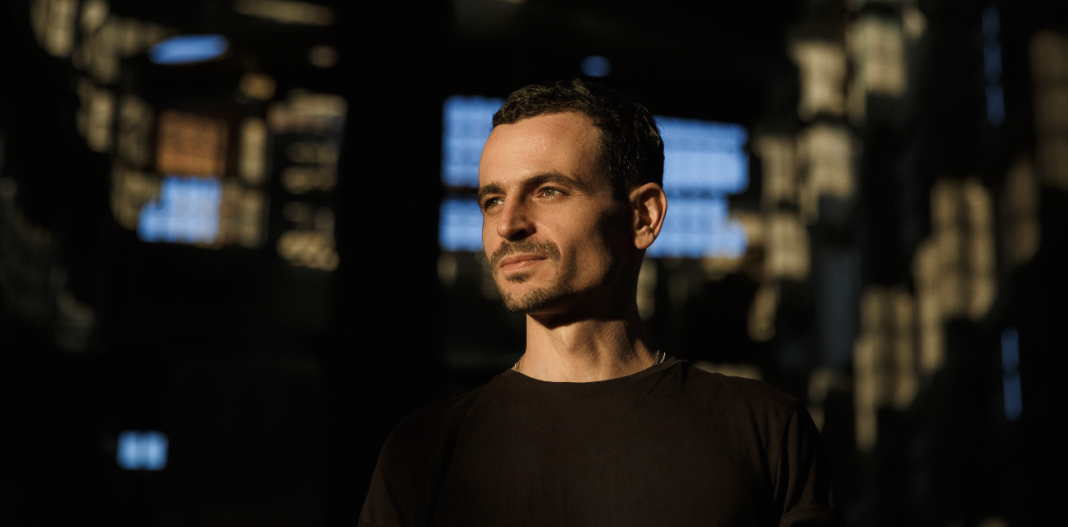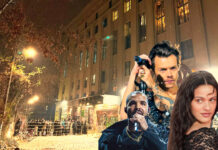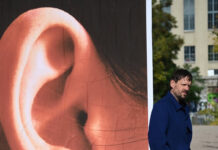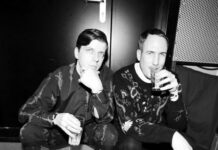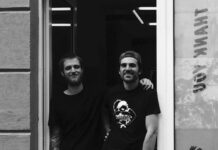Photo: Uli Kaufmann (Barker)
If Sam Barker’s name doesn’t immediately ring a bell, that’s probably because he seems to feel much more comfortable to be pulling the strings than standing in the spotlight himself. As one of the people behind the event series Leisure System at Berghain and the label of the same name as well as one half of the duo Barker & Baumecker however, the English-born producer and DJ has contributed considerably to Berlin’s musical landscape in the past ten years. Having just joined the Ostgut booking agency, Barker is set to perform his first live set in eight years at Säule on November 24th as part of the 32nd edition of Leisure System. His contribution to our Groove podcast is as versatile as one would expect it to be.
Unlike many other producers, you have actually studied music. Is that something you draw on in your work as a musician these days?
I’m not sure how important a traditional music education is in general, it really depends what you want to do. I liked learning to play instruments as a kid, and got the rules through that. You can’t help to draw on things you’ve been taught, but I don’t think a certificate means I know more than anyone else. Most of my friends are deep in their own specific study, and I think it’s better in some ways to find your own path. Probably someone would learn harmonic theory playing around with Ableton Push faster than I did playing scales. I do find it strange that understanding notes has a bad reputation though. They are pretty fundamental things.
Aside from 2012’s Like An Animal EP and a few contributions to some compilations, you so far haven’t released much music as a solo producer. Are you a perfectionist?
(laughs) Hmm, maybe so. I’ve always made a lot of music but getting to the point of saying „this is totally done“ takes some conviction. I’m quite critical. I have terabytes of failed prototypes for new genres, and jams I’m never going to edit down because its more fun to start something new. Collaborating is easier in that sense, as its only partly my decisions. The music becomes an external thing you can discuss in a healthy manner.
In 2016, you were invited to Detroit for an artist residency. How did you find the city and what was it that you were doing there, exactly?
Musicboard Berlin offered me the residency to work on a project I’ve been developing, that uses mechanical percussion tools to transform empty spaces into instruments to make music with. I did a series of videos in empty factories there, with Ray7 from UR, and the first one will be going online soon. Detroit was the perfect city to work on this particular project, and somewhere I’ve wanted to go for a long time. The city is still in poverty but people are resourceful. Urban farms have popped up in the gaps, to give people living in poor neighbourhoods access to fresh produce. Everywhere you see art made from salvaged materials, empty walls becoming canvases, empty buildings becoming galleries. Techno was created on borrowed or stolen drum machines. It’s incredible how much is made with so little. I was staying at Submerge, which is the distribution hub for most Detroit labels, but also the HQ for Underground Resistance, and where John Collins and Mike Banks run the Detroit Techno Museum and maintain a complex of studio rooms for local producers. It’s a busy production line for Detroit artists. Impress Mike with a demo and he might give you a room, do something good and it might get a release and distribution, if that goes well, you might end up in the techno museum yourself one day. Detroit taught me that once you have a roof over your head and food to eat, hope is the next essential element, and communities are creating it for themselves because they get none from the state. I realised how important hope and community are for human survival, and that this is the deeper significance of music to the city – it has reliably provided both through the toughest of times.
Together with nd_baumecker, you released a slew of releases as Barker & Baumecker that at times depart severely from the usual dance music tropes. How would you characterise your musical approach?
Working with Andi, I suppose we’re just trying to have fun in our studio and make something we would both listen to or play. It’s a good challenge since we’ve both got quite different tastes and play different sets. But there’s a big common ground, too. We’ve been more productive together than individually in recent years, so it’s a good partnership.
You have co-founded the Leisure System label in 2012, releasing music by a variety of artists ranging from Pixelord to Jimmy Edgar and Travis Stewart’s JETS project and even Electro legends Dopplereffekt. What is the underlying philosophy behind Leisure System as a label?
For Ned [Beckett] and myself it’s about building a solid platform for music outside of the usual scenes. The best music comes from gifted weirdos and misfits trying things out, and Leisure System tries to support these artists as much as possible. Longevity is also important. Music that will go on to be timeless is not easy to recognise, but to have a catalogue that still sounds good in 20 years, that would be the ultimate success. It’s ambitious I suppose but this is a question we ask when considering a release.
As an event series, Leisure System started in 2008 while Dubstep was still in full swing and since then has put a heavy emphasis on music from the wider Hardcore Continuum. How receptive to that has the – reputedly Techno-purist – Berlin in the past nine years?
It’s not always easy, and generally new styles are slower to get accepted in Berlin; such as dubstep – by the time Berlin picked up, it was already uncool in the UK. There is a surface identity of techno purism here, but it’s going out of fashion I think. A lot of DJs I know have really broad collections, and people going to parties are increasingly asking for more than the usual formulaic stuff. When Marcel Dettmann programmed a lot of electro acts for his night at Berghain, the general response seemed to be „at last something different!“, but really it’s always been going on, with Leisure System or SUB:STANCE or the weird things Andi would put into the programme over the years. I get the feeling people are readier than ever for some musical diversity, it just needs some approval from the „elders“ to get going perhaps.
Your contribution to our Groove podcast is very diverse in style, combining gentle Ambient tunes with hard-hitting Techno and the occasional breakbeat. What was your idea behind it?
Not much to say really… I wanted to make a techno mix you can listen to at home, and put together some of my favourite tracks from this year that I’ve been playing a lot.
On November 24th, you will play your first live set in eight years at Berghain’s Säule for the 31st edition of Leisure System. What will the set sound like – and the set-up look like? You have a reputation as a fan of all things hardware.
I’ve been working on music with a pretty strict concept recently. I’m usually not so friendly with imposed restrictions, but I’m finding it to be really inspiring. I don’t want to divulge much yet, but it will be an experiment – and yes, using hardware.
Stream: Barker – Groove Podcast 132
01. Djrum – Showreel Pt1
02. Skee Mask – Inti
03. Tim Xavier – Little Black Dress
04. Thinkfreak – Forte
05. Etapp Kyle – Ritual
06. Mark Henning – Lithium
07. Andrea – Machine
08. Yaleesa Hall x Malin – Artin (Original Mix)
09. Christian Wünsch – Organic Molecules
10. Fabrizio Rat – Lupo
11. Alex Tomb – Ratatouille Mess (Original Mix)
12. Machine Woman – Iron Curtain
13. Sophia Saze – Lost (Benjamin Damage Remix)
14. Clouds – Chained To A Dead Camel (Perc Remix)
15. Christian Morgenstern – The Future Is On Fire Pt.1 (Stanislav Tolkachev Remix)
16. Minude – Probability #1
17. Lewis Fautzi – Ionic Bonding
18. Lag – Stari Grad
19. Fraxinus – Disruptor
20. Aquarian & Deapmash – Requiem
21. Oscar Mulero – Cave
22. Cio D’Or – Goldbrokat (Donato Dozzy Ambient Remix)
23. Ténèbre – Axe Nord-Sud
